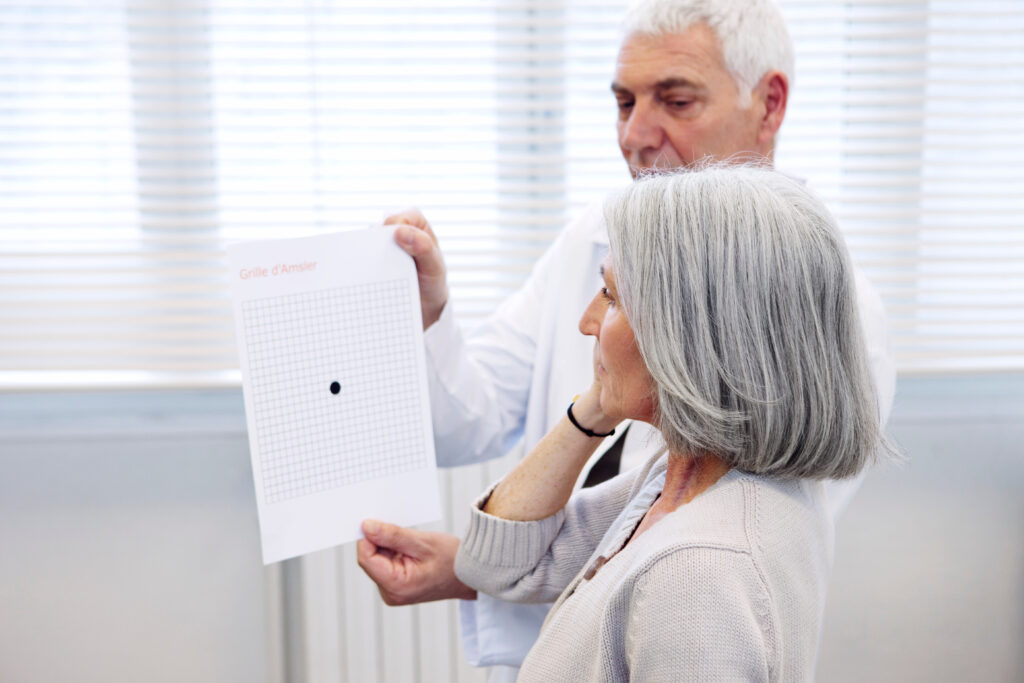
Eye injections are an efficient, safe, and non-invasive way of slowing or halting vision loss caused by many retinal conditions. Injections contain medication designed to stop abnormal blood vessel growth, bleeding, or fluid leakage in the retina.
What is Ant-VEGF?
Ant-VEGF therapy can be used to slow macular degeneration's progress by administering four weekly injections depending on its severity.
Anti-VEGF therapy works to block VEGF, produced by abnormal blood vessels in the eye. By inhibiting it, new blood vessels do not form, slowing or stopping macular degeneration progression.
VEGF is produced in response to low oxygen levels by retina, iris, and choroid plexus cells in response to hypoxia (low oxygen levels)(12). It causes endothelial cell proliferation, increased vascular permeability and inflammation; binding tightly with two high-affinity tyrosine kinase receptors: VEGFR-1 (fms-like tyrosine kinase-1 or Flt-1) and VEGFR-2 (kinase insert domain-containing receptor or KDR) expressed on endothelium cells on surface vascular endothelium.
Signaling of VEGF through these receptors initiates a number of downstream events, such as nitric oxide production, cell membrane and cytoskeleton reorganization, monocyte/macrophage migration and recruitment of hematopoietic progenitor cells - all which have been implicated as essential in the progression of neovascular AMD.
How do Ant-VEGF Injections Work?
Anti-VEGF eye injections are used to treat wet macular degeneration (AMD) and other eye conditions in which abnormal, weak blood vessels form beneath the retina and leak fluid and blood that damage vision loss, including macular degeneration.
VEGF, or Vascular Endothelial Growth Factor, is an intracellular protein produced in our bodies which promotes new blood vessel formation. When applied directly to eye conditions, however, VEGF can promote abnormal growth of abnormal blood vessels underneath the retina that leak fluid or blood into retinal light receptors, leading to vision loss or blindness.
Treatments for abnormal vessels (called choroidal neovascularization ) often involve intravitreal injections with anti-VEGF drugs. An injection will usually be made into your vitreous gel filling the interior of your eyeball.
Are Ant-VEGF Injections Painful?
If you have been diagnosed with macular degeneration, your doctor may suggest obtaining eye injections to slow its progress and preserve your vision. Although the injections might sound unpleasant at first, rest assured that they're painless procedures which could save your sight.
Before injecting, your eye doctor will ensure that both eyes have been effectively numbed with drops before inserting a thin needle into your pars plana (white part of eye) for administering the medication.
The drug will block vascular endothelial growth factor (VEGF), a substance which helps keep blood vessels open, from leaking and expanding within your eyes - this could prevent wet AMD, which causes rapid loss of central vision, from progressing further.
People may experience mild discomfort following injection, though this should subside within several days. If severe discomfort or changes to vision arises, please reach out immediately to a macular clinic for treatment.
Are Ant-VEGF Injections Safe?
Anti-VEGF injections may help protect vision loss and slow the progression of wet age-related macular degeneration by blocking VEGF, a protein responsible for abnormal blood vessel growth and leakage in your eye.
Before giving injections, your doctor will numb your eyes using special eye drops and place the needle into each of your eyes through the white part (sclera). They then inject medication directly into your vitreous.
Once the numbing drops wear off, you may experience redness or floaters that should dissipate within a day or two. Any vision blurriness caused by these floaters should clear within this period; otherwise you should feel no pain from injections.





